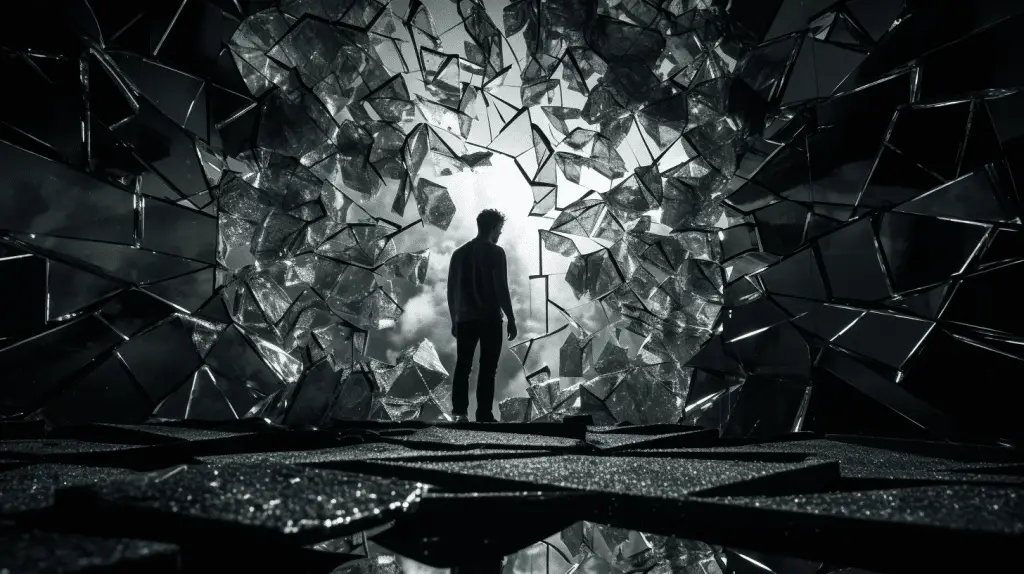Breaking a mirror is said to bring seven years of bad luck. This is a superstition that has been passed down through generations and is still believed by many today. But where did this belief come from, and is there any truth to it?

The origins of this superstition are unclear, but it is believed to date back to ancient Greece and Rome. In those times, mirrors were considered to be magical objects that could reflect a person’s soul. Breaking a mirror was seen as an act of destruction that could bring harm to one’s soul, leading to seven years of bad luck. This belief has persisted over time and is still a common superstition today.
Despite the widespread belief in the bad luck associated with breaking a mirror, there is no scientific evidence to support this claim. It is simply a superstition that has been passed down through generations. However, if you are superstitious and want to avoid any potential bad luck, it is best to handle mirrors with care and avoid breaking them if possible.
Origins of the Superstition
https://www.youtube.com/watch?v=gXcfIa06Dm8&embed=true
The belief that breaking a mirror brings seven years of bad luck is one of the most well-known superstitions in many cultures. The origins of this superstition are not entirely clear, but it is believed to have originated in ancient Rome.
The ancient Romans believed that mirrors had the power to reflect a person’s soul. Therefore, breaking a mirror was thought to cause damage to the soul and bring misfortune upon the person who broke it. This belief was also held by the ancient Greeks, who believed that mirrors were connected to the goddess of love, Aphrodite.
During the Roman Empire, mirrors were expensive and considered a luxury item. It is thought that the superstition about breaking mirrors may have been created as a way to discourage people from wasting money on such an expensive item. In addition, the seven-year period of bad luck may have been chosen because it was believed to be the amount of time it took for the body to renew itself completely.
While the origins of the superstition are rooted in ancient beliefs, it is still prevalent in many cultures today. Some people believe that breaking a mirror is a sign of impending bad luck, while others see it as a mere coincidence. Regardless of one’s personal beliefs, the superstition about breaking mirrors remains a well-known and widely recognized superstition in many parts of the world.
Mirror and Reflection Beliefs
Mirrors have been a source of fascination and superstition for centuries. Many cultures around the world have beliefs and traditions related to mirrors and reflections. In this section, we will explore some of these beliefs and their origins.
Mirrors in Ancient Cultures
The ancient Greeks and Romans believed that mirrors were devices of the gods and that reflected images held mysterious powers. Damaging a mirror was thought to invite the wrath of the gods. In fact, the Romans believed that a person’s health changed every seven years, and breaking a mirror would cause seven years of bad luck.
In Chinese culture, mirrors were used as a tool for divination. They believed that a person’s fate could be revealed by looking into a mirror and seeing their reflection. Mirrors were also used to ward off evil spirits and protect against bad luck.
Symbolism of Reflection
In many cultures, reflections are seen as a representation of the soul. This belief is the reason why breaking a mirror is believed to bring seven years of bad luck. It is thought that the reflection in a mirror not only shows a person’s physical appearance but also their soul. Breaking a mirror, therefore, symbolizes a broken soul and invites bad luck.
In some cultures, reflections are also associated with the afterlife. In ancient Egypt, for example, mirrors were often placed in tombs to help the deceased navigate the afterlife. The belief was that the mirror would reflect the path to the underworld, allowing the deceased to find their way.
In conclusion, mirrors and reflections have been an important part of many cultures throughout history. From divination to protection against evil spirits, mirrors have been used for a variety of purposes. The belief that breaking a mirror brings seven years of bad luck is just one of the many superstitions related to mirrors and reflections.
The Role of Number Seven

The superstition that breaking a mirror brings seven years of bad luck is tied to the significance of the number seven in ancient Rome. The Romans believed that every seven years, life renewed itself, making seven a sacred number.
This belief in the mystical power of the number seven is also present in other cultures and religions. In Christianity, for example, there are seven deadly sins, seven sacraments, and seven days of creation. In Hinduism, there are seven chakras, and in Islam, there are seven heavens.
The idea of seven years of bad luck resulting from breaking a mirror may have also been influenced by the belief that seven hours was the time it took for a person’s soul to renew itself.
However, there is no scientific evidence to support the idea that breaking a mirror brings bad luck for seven years or any other period of time. It is merely a superstition that has been passed down through generations.
While it is important to respect cultural beliefs and traditions, it is also essential to approach them with a critical eye and not take them as absolute truth.
Consequences of Breaking a Mirror
Breaking a mirror is often considered a sign of bad luck, and the belief that it brings seven years of misfortune is widely known. While the origins of this superstition are unclear, it has been around for centuries and is still prevalent in many cultures today. Here are some of the potential consequences of breaking a mirror.
Seven Years of Bad Luck
One of the most well-known consequences of breaking a mirror is the belief that it brings seven years of bad luck. This belief is thought to have originated from ancient Rome, where it was believed that life renewed itself every seven years. Breaking a mirror was seen as interrupting this cycle and bringing misfortune for the next seven years.
Soul and Body Impact
In some cultures, mirrors are believed to reflect more than just a person’s physical appearance. They are thought to reflect a person’s soul, and breaking a mirror is seen as damaging both the body and soul. This belief is particularly prevalent in ancient Greek and Roman cultures, where reflected images were thought to have mystical powers.
While there is no scientific evidence to support the idea that breaking a mirror brings bad luck, the belief persists in many cultures around the world. Whether you believe in the superstition or not, it is always a good idea to handle mirrors with care to avoid accidents and potential injuries.
Remedies to Counteract the Curse
Breaking a mirror is said to bring seven years of bad luck. However, there are some remedies that can be used to counteract the curse. These remedies are based on various rituals and practices that have been passed down through generations and cultural variations.
Rituals and Practices
One of the most common remedies is to bury the broken pieces of the mirror. This is believed to prevent the curse from spreading. Another common remedy is to sprinkle salt on the broken pieces of the mirror and then sweep them up and throw them away.
Some people believe that placing a tombstone or a horseshoe near the broken mirror can help counteract the curse. Others recommend spinning in circles three times and then grinding the broken pieces of the mirror into a fine powder. This powder can then be scattered in a south-running stream.
Another popular remedy is to light a candle and let it burn down completely. This is believed to help release the negative energy that caused the curse. Some people also recommend washing the left shoulder with salt water to cleanse the body of any negative energy.
Cultural Variations
Different cultures have their own variations of remedies to counteract the curse of a broken mirror. For example, in some cultures, it is believed that breaking a mirror on a full moon will bring good luck instead of bad luck.
In some cultures, circles are believed to hold protective powers. Therefore, some people recommend walking around the broken mirror in a circle three times while chanting a protective mantra.
In some cultures, spirits are believed to be responsible for the curse of a broken mirror. Therefore, some people recommend leaving an offering of food or drink for the spirits to appease them.
Overall, there are various remedies that can be used to counteract the curse of a broken mirror. While there is no scientific evidence to support these remedies, many people believe in their effectiveness. It is important to remember that these remedies should be used with caution and that avoiding bad luck ultimately depends on one’s own actions and decisions.
Superstitions and Psychological Impacts
Superstitions are beliefs that are not based on reason or scientific knowledge. They are often passed down from generation to generation and can be deeply ingrained in a culture. One such superstition is the belief that breaking a mirror will result in seven years of bad luck. While this superstition may seem harmless, it can have a significant psychological impact on individuals who believe it.
Anxiety and Guilt
Believing in the superstition that breaking a mirror will result in seven years of bad luck can lead to anxiety and guilt. Individuals who break a mirror may feel anxious about the potential consequences of their actions. They may also feel guilty for breaking the mirror and believe that they are responsible for any bad outcomes that occur in their life during the following seven years.
Performance and Stress
The belief in the superstition that breaking a mirror will result in seven years of bad luck can also impact an individual’s performance and stress levels. If an individual believes that they are experiencing bad luck as a result of breaking a mirror, they may become more stressed and anxious. This can lead to a decrease in performance in various areas of their life, such as work or school.
It is important to note that there is no scientific evidence to support the belief that breaking a mirror will result in seven years of bad luck. While it is always important to exercise common sense and be careful when handling fragile objects, smashing a mirror does not necessarily lead to bad outcomes.
Overall, the belief in the superstition that breaking a mirror will result in seven years of bad luck can have a significant psychological impact on individuals who believe it. It can lead to anxiety, guilt, and stress, which can negatively impact an individual’s performance and well-being.
Superstitions in Different Cultures
Asian Societies
In some Asian societies, breaking a mirror is not considered to be unlucky. However, there are other superstitions that are believed to bring bad luck. For example, sweeping a floor after sunset is believed to bring bad luck. Similarly, leaving chopsticks standing in a bowl of rice is considered to be a curse.
Western Societies
In Western societies, breaking a mirror is believed to bring seven years of bad luck. This superstition dates back to ancient Rome, where it was believed that a person’s health changes every seven years. If a mirror was broken, it was believed that the person’s health would also be affected for the next seven years.
Another common superstition in Western societies is the belief that walking under a ladder brings bad luck. This superstition has roots in Christian symbolism, where the ladder represents the Holy Trinity of the Father, Son, and Holy Spirit. Walking under a ladder was seen as an act of disrespect towards the Holy Trinity.
In some Western cultures, a black cat crossing your path is believed to bring bad luck. However, in other cultures, such as ancient Egypt and Greece, black cats were considered to be symbols of good luck and prosperity.
In the United States, it is believed that the 13th floor of a building is unlucky. Many buildings do not have a 13th floor, and instead, the floor is labeled as 12A or 14. Similarly, finding a lucky penny is considered to bring good luck in some Western cultures.
Social and Psychological Origins of Superstitions
Superstitions have been around for centuries and continue to persist in modern society. They are often based on social constructions and patterns that are perceived as cause-and-effect relationships. Social psychologists have studied the origins of superstitions and have found that they stem from the human mind’s tendency to find useful patterns and cause-and-effect relationships, even when they do not exist.
One of the main reasons that superstitions persist is that they can provide a sense of control over reality. By following a certain ritual or avoiding a particular action, people believe that they can influence the outcome of a situation. This belief in cause-and-effect patterns can be reinforced by coincidence, where a positive outcome is attributed to a particular action, even if it was not the true cause.
Superstitions can also have social origins, where false beliefs are perpetuated within a group as a way to promote group solidarity. For example, the belief that breaking a mirror leads to seven years of bad luck has been around for centuries and is still widely believed today. This superstition may have originated from the fact that mirrors were once expensive and rare, so breaking one was seen as a serious offense. Over time, the belief in the bad luck associated with breaking a mirror became ingrained in society and was passed down through generations.
In conclusion, superstitions are a complex phenomenon with social and psychological origins. They persist because they provide a sense of control over reality and can be reinforced by coincidence. Superstitions can also have social origins, where false beliefs are perpetuated within a group as a way to promote group solidarity. Overall, it is important to critically examine superstitions and question their validity in order to avoid being influenced by false beliefs.
Conclusion

The belief that breaking a mirror will bring seven years of bad luck is a common superstition that has been around for centuries. While there is no scientific evidence to support this claim, many people still hold onto this belief.
Superstitions, in general, are based on cultural and societal beliefs that have been passed down through generations. They often involve the attribution of supernatural powers to objects or events that have no scientific explanation.
In the case of breaking a mirror, it is likely that the superstition originated from ancient Greek and Roman cultures, where reflected images were thought to have mysterious powers. It is possible that the belief in the power of mirrors to reflect one’s image may have led to the idea that breaking a mirror could cause harm to one’s soul or future.
Despite the lack of evidence, the belief in the seven years of bad luck caused by breaking a mirror persists. For those who do believe in the superstition, there are various techniques to avoid the bad luck, such as burying the broken pieces or reciting a specific chant.
Ultimately, whether or not one believes in the superstition surrounding broken mirrors is a matter of personal belief. However, it is important to remember that these beliefs are not based on scientific fact and should not be taken as such.
Steve is the creative force behind My Unique Tales, a blog dedicated to sharing captivating stories that explore the human experience in all its complexity. With a passion for writing and a talent for crafting engaging narratives, Steve's blog is a treasure trove of imaginative tales that transport readers to other worlds and challenge them to see things from new perspectives. From epic adventures to intimate character studies, Steve's stories are always thought-provoking and emotionally resonant. With a growing following of readers who appreciate his unique voice and creative vision, Steve is quickly becoming a rising star in the world of online storytelling.






